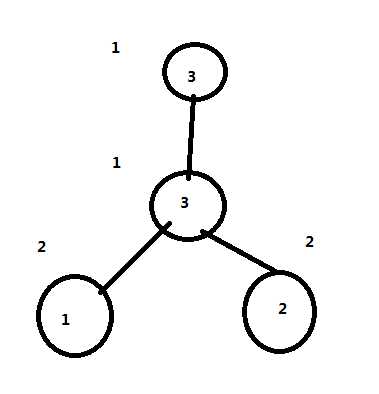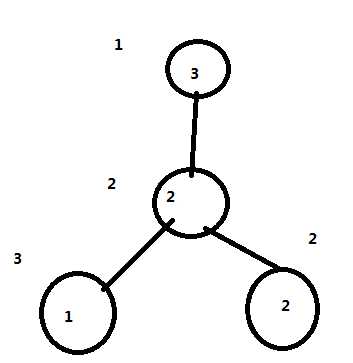4817: [Sdoi2017]树点涂色
Time Limit: 10 Sec Memory Limit: 128 MB
Submit: 629 Solved: 371
[Submit][Status][Discuss]
Description
Bob有一棵n个点的有根树,其中1号点是根节点。Bob在每个点上涂了颜色,并且每个点上的颜色不同。定义一条路
径的权值是:这条路径上的点(包括起点和终点)共有多少种不同的颜色。Bob可能会进行这几种操作:
1 x:
把点x到根节点的路径上所有的点染上一种没有用过的新颜色。
2 x y:
求x到y的路径的权值。
3 x y:
在以x为根的子树中选择一个点,使得这个点到根节点的路径权值最大,求最大权值。
Bob一共会进行m次操作
Input
第一行两个数n,m。
接下来n-1行,每行两个数a,b,表示a与b之间有一条边。
接下来m行,表示操作,格式见题目描述
1<=n,m<=100000
Output
每当出现2,3操作,输出一行。
如果是2操作,输出一个数表示路径的权值
如果是3操作,输出一个数表示权值的最大值
Sample Input
5 6 1 2 2 3 3 4 3 5 2 4 5 3 3 1 4 2 4 5 1 5 2 4 5
Sample Output
3 4 2 2
题解:
其实这道题考的十分妙啊,对LCT的虚实边性质进行了充分的利用。
我们读完题发现操作2可以很快想到树剖,操作3可以维护dfs序在线段树上查询子树信息。
但是操作1并不是树剖能解决的;
再来看看操作1的特点 :每次只会修改一种从未出现的颜色,并且一定是从当前点修改到根节点。
然后神奇的操作就来了 :
一开始我们按原树建出lct,只是lct中全部都是虚边,一个点到根节点不同 颜色数量就是它往上到根节点经过虚边数量+1。
每次操作1相当于就是以把当前点accees上去,这样同样颜色的就以实边连在一起了。是不是很神奇。。
然后再来看看怎么统计答案,我们看看lct中什么时候会变虚实边关系,当然就是access了。
access时我们有一句话ch[x][1] = y ,直接把x原来的右儿子覆盖了,变成了新的右儿子,
那么y的虚实关系从虚转为了实,只用找到y中最浅的一个点,对它子树全部贡献-1即可。
然后原来的右儿子从实变为了虚,找到它最浅的一个点,对它子树全部贡献+1即可。
然后我们来看看操作2,是对一条路径进行查询,并不能用树剖做。
但是我们发现一个性质,因为每次修改的颜色都是新的颜色,并且是从当前点修改到根节点,设lca(u,v) != u && lca(u,v) != v
那么u和v一定颜色不同,我们只需要在线段树上单询ask(u) + ask(v) - 2 * ask(lca(u,v)) + 1 即可
但为什么要加那个1

如图,我们查询左下角颜色为1点和右下角的颜色为2的点;当lca颜色和它们不同时发现lca的颜色减多了,要加回来。

当lca和其中一个相同时,我们发现还是减多了,还是得加回来。
一条链的情况自己画图也是同理的。这样对于操作2就用线段树轻松维护了。
操作3????不就是线段树dfs序查询子树吗。
这样我们就神奇的利用了LCT的性质把一道看似树剖的题做成了LCT神题。。
AC代码:
过了样例直接交,一遍交过的酸爽# include <iostream> # include <cstdio> # include <cstring> using namespace std; const int N = 2e5 + 12; int st[N],ed[N],fa[N],ch[N][2],s[N << 2],la[N << 2],n,m,head[N],dt; struct Edge{ int to,nex; }edge[N << 1]; void AddEdge(int u,int v) { edge[++dt] = (Edge){v,head[u]}; head[u] = dt; } bool isroot(int x){return ch[fa[x]][0] != x && ch[fa[x]][1] != x;} void rotate(int x,int d) { int pre = fa[x],g = fa[pre],nex = ch[x][d]; ch[pre][d ^ 1] = nex; if(nex)fa[nex] = pre; fa[x] = g; if(!isroot(pre))ch[g][ch[g][1] == pre] = x; ch[x][d] = pre; fa[pre] = x; } void splay(int x) { int pre,g; while(!isroot(x)) { pre = fa[x],g = fa[pre]; if(!isroot(pre) && !((ch[pre][0] == x) ^ (ch[g][0] == pre)))rotate(pre,ch[pre][0] == x); rotate(x,ch[pre][0] == x); } } int find(int x){while(ch[x][0])x = ch[x][0];return x;} void push(int x){s[x] = max(s[x << 1],s[x << 1 | 1]);} void down(int x) { s[x << 1] += la[x];s[x << 1 | 1] += la[x]; la[x << 1 | 1] += la[x];la[x << 1] += la[x]; la[x] = 0; } void updata(int L,int R,int l,int r,int rt,int d) { if(L <= l && r <= R){s[rt] += d;la[rt] += d;return;} down(rt);int mid = l + r >> 1; if(L <= mid)updata(L,R,l,mid,rt << 1,d); if(R > mid)updata(L,R,mid + 1,r,rt << 1 | 1,d); push(rt); } int Query(int L,int R,int l,int r,int rt) { if(L <= l && r <= R)return s[rt]; down(rt);int mid = l + r >> 1; if(L > mid)return Query(L,R,mid + 1,r,rt << 1 | 1); if(R <= mid)return Query(L,R,l,mid,rt << 1); return max(Query(L,R,l,mid,rt << 1),Query(L,R,mid + 1,r,rt << 1 | 1)); } int ask(int x){return Query(st[x],st[x],1,n,1);} void access(int x) { int y = 0,t; while(x) { splay(x); if(t = find(ch[x][1]))updata(st[t],ed[t],1,n,1,1); ch[x][1] = y;if(t = find(y))updata(st[t],ed[t],1,n,1,-1); y = x;x = fa[x]; } } int hson[N],sz[N],tot,top[N],dep[N],Fa[N],id[N]; void dfs(int u) { sz[u] = 1; for(int i = head[u];i;i = edge[i].nex) { if(sz[edge[i].to])continue; Fa[edge[i].to] = u; dep[edge[i].to] = dep[u] + 1; dfs(edge[i].to); sz[u] += sz[edge[i].to]; if(sz[hson[u]] < sz[edge[i].to])hson[u] = edge[i].to; } } void dfs(int u,int tp) { top[u] = tp;st[u] = ++tot;id[tot] = u; if(hson[u])dfs(hson[u],tp); for(int i = head[u];i;i = edge[i].nex) if(!st[edge[i].to])dfs(edge[i].to,edge[i].to); ed[u] = tot; } int lca(int x,int y) { while(top[x] != top[y]) { if(dep[top[x]] < dep[top[y]])swap(x,y); x = Fa[top[x]]; } return dep[x] < dep[y] ? x : y; } int Q1(int u,int v){return ask(u) + ask(v) - 2 * ask(lca(u,v)) + 1;} int Q2(int u){return Query(st[u],ed[u],1,n,1);} int main() { scanf("%d %d",&n,&m);int tp,x,y; for(int i = 1;i < n;i++) { scanf("%d %d",&x,&y); AddEdge(x,y);AddEdge(y,x); } dfs(1);dfs(1,1); for(int i = 1;i <= n;i++)updata(st[i],ed[i],1,n,1,1),fa[i] = Fa[i]; while(m--) { scanf("%d",&tp); if(tp == 1)scanf("%d",&x),access(x); if(tp == 2)scanf("%d %d",&x,&y),printf("%d\n",Q1(x,y)); if(tp == 3)scanf("%d",&x),printf("%d\n",Q2(x)); } }
